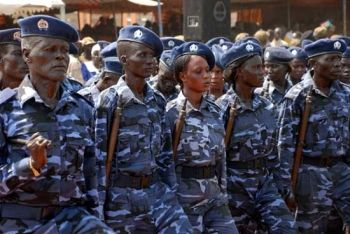
Publisher:
Bonnie King
CONTACT:
Newsroom@Salem-news.com
Advertising:
Adsales@Salem-news.com

~Truth~
~Justice~
~Peace~
TJP
May-07-2011 15:10

 TweetFollow @OregonNews
TweetFollow @OregonNews
Divisions in Sudan' Ruling Party and the Threat to the Country's Future Stability
Alysha Atma Salem-News.com African Affairs CorrespondentThe international community must press the NCP to engage in national dialogue.
 A Sudanese woman stands in front of an electoral poster for the Sudanese National Congress party, headed by President Omar al-Bashir, in Khartoum. Photograph: Nasser Nasser/AP Courtesy: Guardian UK |
(PORTLAND, Ore.) - International Crisis Group (IOM) has urged that unless Sudan’s grievances are addressed by a more inclusive government, the country risks further violence and disintegration even after the South’s independence becomes official in July.
Sudan’s Ruling Party and the Threat to the Country’s Future Stability, the latest report from the International Crisis Group, warns that the National Congress Party (NCP) has not addressed the root causes of chronic conflicts; instead has exacerbated ethnic and regional divisions and deepened their contradictions. Losing acceptance, facing multiple security, political, social and economic challenges, it is deeply divided over the way forward. The party has mobilised its security apparatus to hold back any internal change or uprising, has stifled the debate about Sudan’s diversity and identity, still wants to impose an Arab-Islamic identity for all Sudanese and to keep misusing Sharia (Islamic law) and is ready to sub-divide key states to accommodate political barons.
“President Bashir and his close associates are concerned their party may disintegrate. Worried about a possible coup, they have come to rely increasingly on personal and tribal loyalty to remain in power”, says Fouad Hikmat, Crisis Group’s African Union and Sudan Senior Adviser. “Power is now increasingly centralised in a small clique around the president”.
The 2005 Comprehensive Peace Agreement (CPA) ended the long North-South civil war but has failed to resolve the issues that continue to drive the country’s multiple other conflicts. During that agreement’s six-year run (to end formally in July), the NCP squandered the opportunity to preserve national unity and to establish a stable and democratic state. It failed to implementation many CPA provisions as they would critically weaken its grip on power. Consequently, the Darfur conflict escalated and Southerners chose separation when they voted in their January 2011 self-determination referendum.
In the highly militarised periphery - including not only Darfur but also Southern Kordofan, Blue Nile, the East and other marginal areas - a new sector of discontent with NCP domination is forming, akin to the South’s disgruntlement. Political and military opposition continues, and many Sudanese are calling for wider constitutional arrangements that would distribute power, resources and development equitably among the regions. These issues must be addressed through genuine national dialogue and managed by an inclusive and acceptable government if Sudan is to avoid more violence and division.
 |
A united international community, with the African Union, the Arab League and the UN in the forefront, must press the NCP to engage in national dialogue to foster the foundation for national stabilization that includes clear principles for establishing a comprehensive, collectively constructed and agreed constitutional pact.
“With the South’s secession but months away, the situation in the remainder of the country requires review as a whole”, says Comfort Ero, Crisis Group’s Africa Program Director. “The NCP intends to continue the status quo - to maintain the political system as is, make isolated peace deals with whoever raises the gun and mobilise Islamist constituencies against their fellow citizens. This is a prescription for more troubles in a long-suffering land”.
Source: International Crisis Group
 Alysha Atma spends many hours working on projects that support and benefit the beleaguered people of African nations who spend way too much time off the western media's radar. This writer explains that she is a culmination of all her experiences, most importantly knowledge she says, and all that she still needs to learn; lessons of love, laughter and the extraordinary giving of both young and old. She says she has the enormous fortune of learning from the best; every person around her, and the amazing strength and fortitude of those she has never met but will always strive to listen to. "I continue to work and write because I believe in the power of community and the power of one, both contradictory to each other and yet can move together in a very powerful way. I feel a responsibility to use my place, freedoms and connections here in the US to stand up and yell for those who need my voice and actions. I have seen such strength in my fellow humans that I cannot even begin to comprehend, they have traveled distances, have gone without food, water, shelter and safety for days and weeks at a time. I have a responsibility as a fellow human to put our common humanity before anything else. Everyone deserves to look towards tomorrow, to dream of a safe future and to have a peaceful present." You can write to Alysha Atma at: alyshann78@comcast.net
Alysha Atma spends many hours working on projects that support and benefit the beleaguered people of African nations who spend way too much time off the western media's radar. This writer explains that she is a culmination of all her experiences, most importantly knowledge she says, and all that she still needs to learn; lessons of love, laughter and the extraordinary giving of both young and old. She says she has the enormous fortune of learning from the best; every person around her, and the amazing strength and fortitude of those she has never met but will always strive to listen to. "I continue to work and write because I believe in the power of community and the power of one, both contradictory to each other and yet can move together in a very powerful way. I feel a responsibility to use my place, freedoms and connections here in the US to stand up and yell for those who need my voice and actions. I have seen such strength in my fellow humans that I cannot even begin to comprehend, they have traveled distances, have gone without food, water, shelter and safety for days and weeks at a time. I have a responsibility as a fellow human to put our common humanity before anything else. Everyone deserves to look towards tomorrow, to dream of a safe future and to have a peaceful present." You can write to Alysha Atma at: alyshann78@comcast.net
Articles for May 6, 2011 | Articles for May 7, 2011 | Articles for May 8, 2011






Terms of Service | Privacy Policy
All comments and messages are approved by people and self promotional links or unacceptable comments are denied.
agnesruth May 9, 2011 1:24 am (Pacific time)
hi from my studies, and admittedly in my opinion, what follows is a list of a few things that happened over the past 110 years, in more or less chronological order, that have had a major impact on shaping our world.
project home builders
Editor: Agnes, there is no list attached to this, feel free to try again. Thanks.
[Return to Top]©2025 Salem-News.com. All opinions expressed in this article are those of the author and do not necessarily reflect those of Salem-News.com.